You are here
New Releases
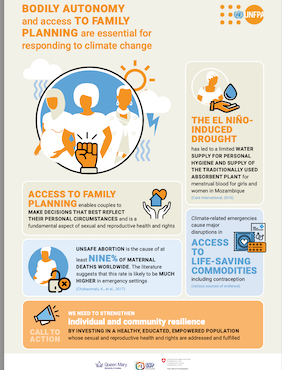
Bodily Autonomy and Access to Family Planning are Essential for Responding to Climate Change
This infographic draws the links between climate change, family planning and bodily autonomy. It explains why we need to strengthen individual and community resilience by investing in a healthy, educated and empowered population whose sexual and reproductive health needs are addressed.
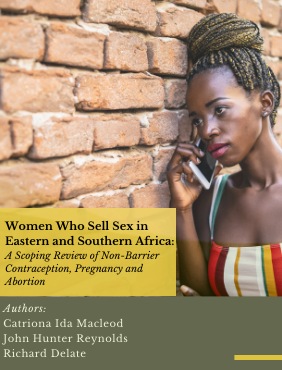
Women Who Sell Sex in Eastern and Southern Africa: A Scoping Review of Non-Barrier Contraception, Pregnancy and Abortion
A scoping review methodology was employed with the aim to collate findings on non-barrier contraception, pregnancies, and abortion amongst WSS in Eastern and Southern Africa (ESA).
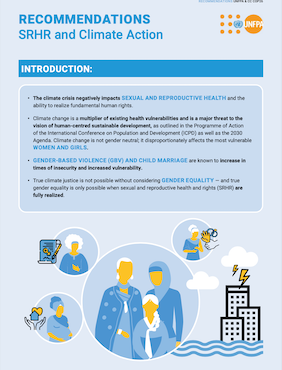
Recommendations: Sexual and Reproductive Health and Rights and Climate Action
The climate crisis negatively impacts sexual and reproductive health, and the ability to realize fundamental human rights. Read UNFPA's recommendations on achieving sexual and reproductive health and rights and climate action.
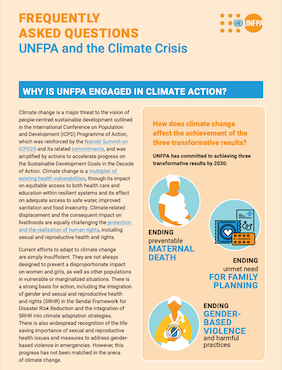
Frequently Asked Questions: UNFPA and the Climate Crisis
Climate change is a major threat to the vision of people-centred sustainable development. It multiplies existing health vulnerabilities, through its impact on equitable access to both health care and education within resilient systems and its effect on adequate access to safe water, improved sanitation and food insecurity. Current efforts to adapt to climate change are simply insufficient. Read about why UNFPA is taking up the cudgel for climate action.
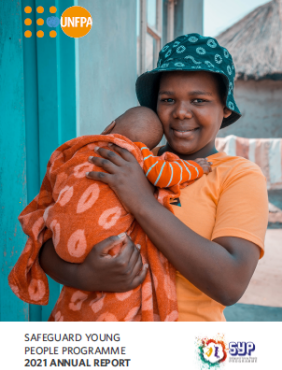
Safeguard Young People Programme 2021 Annual Report
The regional Safeguard Young People (SYP) programme empowers adolescents and young people aged 10 to 24 years to protect themselves from sexually transmitted infections (including HIV), early and unintended pregnancy, unsafe abortion, early marriage, gender-based violence (GBV) and other harmful cultural practices. In achieving this end, the SYP programme promotes gender-equitable norms, an enabling legal and policy environment, comprehensive sexuality education (CSE), and high-quality adolescent and youth-friendly sexual and reproductive health (AYFSRH) services.
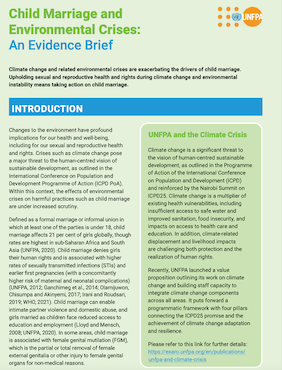
Child Marriage and Environmental Crises: An Evidence Brief
Child marriage is a violation of a girl’s human rights and can present challenges for her health and well-being across the life course. Climate change increases vulnerability and, as a result, can erode the ability of families and communities to ensure and uphold sexual and reproductive health and rights. Building resilience to climate change means tackling the complex issues of rights, health and justice, including child marriage.
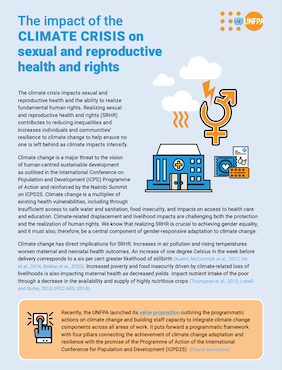
The Impact of the Climate Crisis on Sexual and Reproductive Health and Rights
The climate crisis impacts sexual and reproductive health and the ability to realize fundamental human rights. Realizing sexual and reproductive health and rights contributes to reducing inequalities and increases individuals and communities’ resilience to climate change to help ensure no one is left behind as climate impacts intensify.
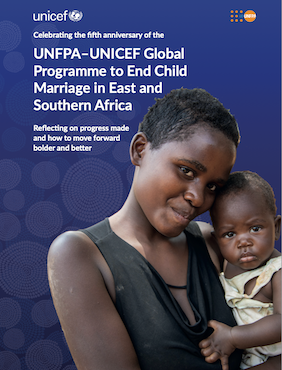
Celebrating the Fifth Anniversary of the UNFPA–UNICEF Global Programme to End Child Marriage in East and Southern Africa
This report is based the Global Programme to End Child Marriage's (GPECM) fifth anniversary celebrations, reflecting on successes, good practices and lessons learned, emerging and linked issues, such as climate change and FGM, and financing initiatives. It pulls out the key messages for partners in the East and Southern Africa region and includes the call to action, with which the celebration closed, expressing renewed commitment to end child marriage by 2030.
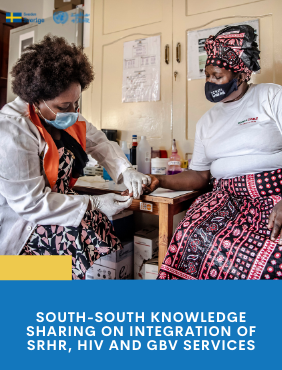
South-South Knowledge Sharing on Integration of SRHR, HIV and GBV Services
In April 2022, the joint United Nations initiative 2gether 4 SRHR, participated in a successful South-South Exchange with UNFPA China.
Program staff and partner organizations from Botswana, China, Uganda and Zimbabwe showcased models on efforts made to integrate sexual and reproductive health and rights (SRHR), HIV and GBV from their respective regions.
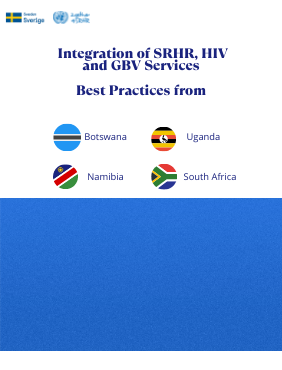
Best Practices: Models of Integration of SRHR, HIV and GBV Services from Four Countries
The rationale for the integration of services is to increase the effectiveness and efficiency of the health system and to meet people’s needs for accessible, acceptable, convenient, client-centred and comprehensive care.